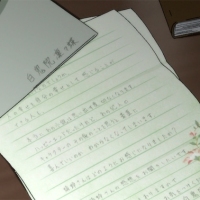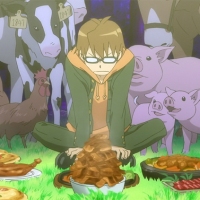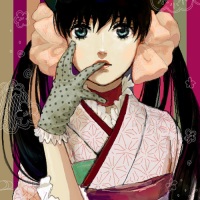Prom was in a month, and all the high school seniors were scrambling to find dates, lest someone ends up a loner in this momentous dance of our lives—well, for those without partner, girlfriend, boyfriend, or implicit best friend at least. Conversations and gossips all revolved around who was going to prom with whom, who got rejected by whom, and most importantly, who were still available. As usual, I was chatting with my friends in our free period after lunch. This particular day, we had a junior girl with us. We were hoping to set her up with this desperate kid in our group. As we prodded and sugarcoated and romanticized and gauged her interest, I asked her what she finds hot.
“Passion”
“Passion?”
“Yea, I like it when someone’s really into something and take hella time to work at it.
“Like what?”
“Like water polo or wrestling or something.” (My school had a killer water polo and wrestling team.)
“Or like Magic Cards?”
“Uh… Yea… I guess?”
Although the prom date did not quite pan out—I guess my friend needed to be a little better at Magic—the conversation struck me. Indeed, there is something very attractive about passion.
__________________________________________________

Perhaps that explains my adoration for Tari Tari. Konatsu, driven by her passion for singing, strives to perform at the year-end school culture festival. After she gets kicked out of choir because of a stage fright episode, she recruits a group of similarly passionate people (albeit passionate about different activities) to create her own club: Choir and Sometimes Badminton Club. Together, they hope to take the stage against all odds: the choir teacher who is bent on obstructing Konatsu’s efforts, choir students who look down on the newfound club’s amateurity, and event city plans to tear down the school. At stake is not only a meaningful final high school project, but a maturation of their cultivated interests over the years.
Along the way, Tari Tari presents several differing approaches to passion, among them the dichotomy between the Choir Club and the Choir and Somtimes Badminton Club. The former has aspirations of being professional musicians, while the latter takes a more casual tone. Thus, the two clubs clash often, especially because the Choir Club constantly dismisses and looks down upon the lead cast.[1] Besides this stark contrast, subtler differences in attitudes toward interests exist among the members of Choir and Badminton Club as well. Of the five main characters, Tanaka’s goals resemble those of the Choir Club the most, but he faces them, perhaps, with even more determination. At a school with little badminton support, Tanaka still aims to be a professional player. On the other far-flung hand, we have Wien (Maeda), whose passion is much more fanciful. Wien has an obsession with a super sentai show. Their stories show two extreme aspects of passion—profession and hobby. Whereas Tanaka is actively working towards a specific goal, Wien has a more passive pastime, a matured fandom generated through various means. The common thread, however, is that their interests still flourish despite their being the lone participants (at least until Konatsu recruits them to her club). Tanaka does not mind playing against the wall in an empty gym, and Wien is content with his figures, costumes, and posters. Furthermore, when the chance to fully engage in the sentai experience when they are invited to the Choir and Sometimes Badminton Club—and particularly for Wien, when the club is asked to be the small town super sentai heroes—they take the opportunity to fully enjoy the experience with little hesitation or embarrassment. It is with the club that they both solidify their determination and maturity in their passions.
Unlike Tanaka and Wien, whose passions are defined by unwavering attitudes in of an unsympathetic environment, Wakana needs to rediscover her love for music despite her natural talent. When Wakana’s musically-gifted mother died, Wakana associated her death with singing, and sealed away her own passion. When Wakana is finally able to face the death of her mother and come to terms with the unfairness of the world, she does so with the help of her mother’s love and music. In a marvelously poignant moment, the completion of her mother’s song offered Wakana a powerful catharsis. Thus, the maturation of her passion is intimately related to her own growth.
Sawa’s story is my personal favorite, and is also one I found exceedingly relevant. A central theme of Tari Tari is about the possibility of turning a passion into a profession. We saw earlier how driven the Choir Club members and Tanaka are about their ambitions. Sawa is similarly motivated, but her passion takes a different direction: she must redefine what equestrian is to her when being a professional jockey is no longer feasible. Reconciling with an impossibility is a terrifically painful and reflective experience, and one that many can identify with. I imagine that most with an earnest drive have thought about turning their genuine passions into a career. After all, doing something you love from eight to five—working hard at it and getting paid for it—sounds more rewarding than a typical uninspired (at least from one perspective) day job. Yet, is the end goal of our passions really always only about making money?
A good friend, Emily of Atelier Emily, writes of her transition from an artist hoping for a career in art to simply an artist, who is not any less good. and she enjoys the role art plays in her life now[1]. Likewise, Sawa, a fascinating girl with an adorable fashion sense and a knack for excellence, is going through a shift in her approach to horseback riding. When she goes over the weight limit for acceptance into equestrian schools, she must assess whether her passion is defined singly by a professional career. At the end of her story arc, Sawa realizes that she loves horseback riding too much to limit it to a mere career endeavor. That realization is particularly relevant for many at that age; those high school years are significant because it is when we often began shaping our future goals, career trajectories, interests, and lives. In addition, the side commentary on the delicate, and just as pertinent, issue of body image is neatly done. I found watching Sawa go through that early quarter-life crisis and resolve it incredibly satisfying.
Finally, we have Konatsu, who ties all their stories together with her unrelenting passion. She brings an overwhelming but welcomed abundance of energy, and it is brilliant. Indeed, we see Konatsu’s effect on others; we see how such passion can inspire change, strengthen resolve, and touch hearts. For these young adults, that final act for the culture festival is not some mere performance, but the culmination of their developing and maturing passions over the years. Thus, through Konatsu’s efforts and excitement fervor and sincere emotions, Tari Tari delivers a warm, resonant—and maybe even a little bit sexy[2]—story about growing up and about a love of life.
__________________________________________________
- Tari Tari and the glory of love and art
- Passion can be sexy! Besides equestrian, Sawa also excels at archery.

__________________________________________________
More anime and manga reviews
























![Blue Friend [Yuri Manga]](https://i0.wp.com/lh3.ggpht.com/_c3hWUvy__P4/TODtxeH57fI/AAAAAAAABRM/Jrn29X5gz0U/Blue-Friend-yuri-manga-cover-1.jpg?resize=200%2C200)



Glad to hear you enjoyed Tari Tari as much as I did and that Simba’s (Sawa) quest for greatness was your favorite, as she’s my favorite character. Also, just for fun, if you ever wondered what kind of anime character best represents me, it’s a combination between Taichi’s (Bob) optimism and Wien’s (Enrique) silliness that can be taken seriously. I was sad when the show ended but it ended perfectly, so I need not complain too much. Anyhoo, keep on rockiin’ in life and hope to see you again after the next blue moon.
Hahaha, Sawa does have a sort of fiery lioness quality to her, doesn’t she? And I could totally see you as a mix between Taichi and Wien. You are loud and passionate about your hobbies, and I love that about you. ^ ^
Anyways, I’m still mired in stuff, but hopefully I’ll be back before the end of the year. It’s just a lot of things going on right now (mostly academics).
Cheers, Overlord-G!
Tari Tari was pure awesomeness. Sawa was a blessing.
Miss you, I do, friend Yi-san. Hope to see you again someday, I do. Work hard for your dreams. I await your triumphant return when that time comes.
Awww thank you! I doubt I will make a triumphant return, but maybe a quiet, lingering one. ♥
And we’ll all be here waiting with much anticipation.
Reblogged this on Just my guilty pleasure reblog..
You know what’s really humorous? I’m also one of those people who finds passion the most attractive thing in another person. The most beautiful anyone can possibly be is when they’re doing something that they love. ^ ^
Thank you for this lovely post. I feel that Tari Tari was such an overlooked series when it aired, and it deserves more praise and exposure.
For me, relationships are built strongly on conversations, and someone with an ardent passion are just so interesting, even if our passions don’t overlap. And I love listening to someone’s heartfelt talk.
Anyways, I’m really glad you enjoyed the series and the post. Thank you! (That’s very good encouragement since I was trying something a little different with this post, so yay!)
Interesting.. I should watch this..
You really should! It’s a nice, short anime that is not too heavy, but still carries some substance. I enjoyed it a lot!
Ok where do I get the write elaborate English pill :p ? That was really well written.
It was a nice anime for sure, a few things bothered me, but only to a small degree.
Rather funny that Konatsu was the driving factor. In the helped the others to grow and facing their dreams or also problems. Konatsu did it not so much with words, but with her own passion.
I also liked Sawa the most, because of her personality and overall appearance.
I always remember the outfit with the hat, it was so fabulous(*´▽`*)
Oh wieselhead, what a flatterer you are, but I love you for it! Especially so since I tried something new with this post, and I’m so glad to see it work out.
I’d love to hear what your thoughts are on the small things that bothered you.
And yes, Konatsu and Sawa are the two highlights of the anime for sure. I found Sawa especially lovely—that hat, horseback riding, and everything!
Haha it was just honest admiration from my side,
if it flattered you thats also quite nice (@^▽^@)
Ah well I disliked that the two boys didn’t get the same kind of attention as the three girls,
they got nicely directed, interesting drama episodes. In comparison, the tennis guy just struggled with his tennis a bit and Wien just got his funny yet silly “Power Rangers” story.
It was refreshing that the boys and girls mainly saw eachother as clubmates, but on the other hand, I still wished for a kind of budding romance. Tss I could feel how Taichi’s heart broke to pieces in this certain episode. Why were thy treated like this? 😦
Yeah Sawa was wonderful *nods*
Usually I prefer shorter series, but for Tari Tari, the limited episodes and large cast does feel a bit too constraining. The two boys, especially Badminton, are the sacrifice. It’s a fine criticism of the show, and I agree with you. I enjoyed the Power Rangers arc though. I found the lighter tone to give a needed breather between the harder hitting arcs.
That’s a very nice character analyses on all of them, I actually find it a bit difficult to empathize with characters such as Wien and Tanaka, due to such little exposures they get.
Passions can be achieved in almost anything however, whether or not it be hobby or a profession. And indeed, Sawa’s arc play an interesting play on the two, struggling to only see horseback riding as just a profession or something more then that. It’s actually something I’m, and I assume most would be, struggling in regards to their favorite “hobbies”.
I have to agree that Wien and Tanaka don’t get as much exposure as the other characters. Tanaka, especially, didn’t quite have his own arc. Rather, his story was told alongside the others.
I’ll talk a bit about one of my few gripes now then while I’ve got the opportunity. I didn’t actually quite buy Wien’s back story with the little kid. Or rather, I didn’t feel it was powerful or significant enough, especially in comparison to Sawa’s arc.
As for Tanaka, I really wanted him to have his own arc. I wanted to see his passion and how he exhibits it on display.
Anyways, you’re absolutely right about the hobbies. Sigh… It’s a struggle.
What a cute story about that poor Magic Cards kid!
Actually, I found some of the characters’ stories a little bit forced, in particular Wakana’s issues with her mother and Wien’s relation to that Jan kid. The fanservice made up for that, though! Sawa doing archery in your pic looks so cool, and even better on horseback!
Actually I never had a passion similar to that of the characters. Sometimes I think I’m missing something. But then again, I like anime (^_^)
Hehe, it was an awkward story for him, I’m sure.
I tend to agree about Wien’s story. It was not developed fully, and seemed almost as a poor, unnecessary excuse to let him play out his obsessive love for super sentai. It’s poor in that we only see Jan maybe twice in the whole series, and the nature of their relationship is never fully explained. They met and they were friends in Europe; that is all. It’s unnecessary—which for me is the bigger fault—in that I didn’t see a need to justify Wien’s sense of justice or his love for sentai, as Jan’s intrusion seems to want to over-explain.
As for Wakana, her story is actually one that I really enjoyed. The loss of a parent is always hard to get right in anime, especially when there is a tendency toward melodrama, but I found it done rather believably. I could see why she stopped playing piano. Such passivity may not even be as much of a conscious thing, as it is with the case of Wakana, but some people do just become a little less active in those situations.
Anyways, thanks for reading! And I like anime too, even if I have kind of stopped watching much. I need more time.